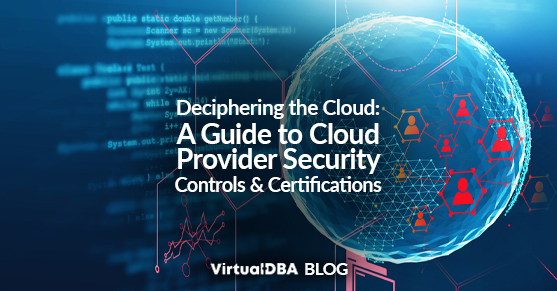Understanding their security posture is paramount when entrusting sensitive data to a cloud provider. This blog post will delve into the various cloud provider security controls and certifications offerings, helping you make informed decisions.
Understanding Cloud Provider Security Controls
Security controls are the safeguards a cloud provider implements to protect data, systems, and networks. They can be categorized into:
- Technical controls: These involve hardware or software components, such as firewalls, intrusion detection systems, encryption, and access controls.
- Administrative controls: These are policies, procedures, and guidelines for managing security, including risk assessments, incident response plans, and security awareness training.
- Physical controls: These encompass physical security measures, such as access controls to data centers, surveillance, and environmental controls.
Key Cloud Provider Security Controls to Look For
While the specific controls vary between cloud providers, here are some essential ones to consider:
- Data Encryption: Ensures data is protected both at rest and in transit.
- Access Management: Implements strong authentication and authorization mechanisms to control access to data and systems.
- Network Security: Protects the cloud infrastructure from unauthorized access through firewalls, intrusion prevention systems, and network segmentation.
- Data Loss Prevention (DLP): Prevents accidental or malicious data loss.
- Incident Response: Outlines procedures for handling security incidents.
- Business Continuity and Disaster Recovery: Ensures uninterrupted service in case of disruptions.
- Vulnerability Management: Identifies and addresses system vulnerabilities.
- Penetration Testing: Regularly assesses the security posture of the cloud environment.
The Role of Cloud Provider Security Certifications
Certifications provide independent verification of a cloud provider’s security practices. Here’s a breakdown of some standard certifications:
SSAE 18 (Service Organization Controls)
- Focus: Assurance of the effectiveness of service organizations’ controls.
- Value: Provides detailed information about a provider’s controls, especially relevant for organizations handling customer data. Note that SSAE 18 encompasses SOC reports, with SOC 2 being particularly appropriate for security.
SOC 2 (Service Organization Controls 2)
- Focus: Security, availability, processing integrity, confidentiality, and privacy.
- Value: Provides detailed information about a provider’s controls, especially relevant for organizations handling customer data.
ISO 27001
- Focus: Information security management system (ISMS).
- Value: Demonstrates a comprehensive approach to security, including risk management, incident response, and continuous improvement.
PCI DSS (Payment Card Industry Data Security Standard)
- Focus: Protection of cardholder data.
- Value: Essential for organizations handling credit card information.
HIPAA (Health Insurance Portability and Accountability Act)
- Focus: Protection of patient health information.
- Value: Critical for healthcare organizations using cloud services.
GDPR (General Data Protection Regulation)
- Focus: Protection of EU citizens’ personal data.
- Value: Essential for organizations handling EU citizens’ data.
FedRAMP (Federal Risk and Authorization Management Program)
- Focus: Security for cloud services used by US government agencies.
- Value: Required for cloud providers seeking government contracts.
Comparing Cloud Provider Security Certifications
No single certification is a silver bullet. The most valuable combination depends on your organization’s specific needs and risk tolerance.
- SSAE 18 (SOC 2) is often considered a baseline for many organizations due to its focus on key security controls.
- ISO 27001 provides a broader framework for information security management.
- Industry-specific certifications (PCI DSS, HIPAA, GDPR, FedRAMP) are essential if your organization handles sensitive data in those domains.
Beyond Certifications
While certifications are valuable indicators, it’s essential to conduct a thorough evaluation of a cloud provider’s security practices. Consider the following:
- Security controls: Review the specific controls implemented by the provider.
- Audit reports: Examine the results of independent audits and assessments.
- Incident response history: Understand how the provider handles security incidents.
- Service Level Agreements (SLAs): Evaluate the provider’s commitment to uptime and availability.
- Due diligence: Conduct your own assessment or engage a third-party security expert.
By carefully considering these factors and the certifications held by a cloud provider, you can make informed decisions to protect your organization’s sensitive data.
If you have any questions, please give us a call.

